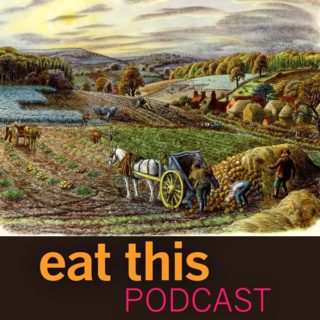Podcast: Play in new window | Download (Duration: 27:36 — 25.4MB)
Subscribe: Google Podcasts | Spotify | Android | RSS | More

Colin Tudge has been writing about food and farming for a long time in a series of thought-provoking books. His latest is The Great Re-Think, which examines the current state of the world and sets out the steps needed to get to where he (and many other people) think we ought to be. They include skill and craft over automation, complexity over simplicity, and diversity over monoculture. The start, though, is to really think about what it is that we want our food system to provide.
A word about the pictures. They are from a Puffin book for children, Farm Crops in Britain, and are undeniably bucolic, rustic, from a bygone age. But that was only 65 years ago. The book was written by Sir George Stapledon, one of the great agricultural scientists of the early 20th century, who wrote at length about many of the same things that we talked about in this episode. I should do one on him.
Notes
- The Great Re-Think: A 21st Century Renaissance is available from Pari Publishing.
- Three places to find out more: The Campaign for Real Farming, the
Oxford Real Farming Conference and The College for Real Farming and Food Culture; all of which come under the umbrella of The Real Farming Trust. - Get tickets for the two-day online discussion of The Great Re-Think.
- There is a Henry George Foundation, “Promoting Economic Freedom Since 1929”.
- Illustrations by S.R. Badmin. I cobbled the banner together from a two-page spread.
- A transcript is available, thanks to the generosity of supporters. Please consider joining them.


[…] Colin Tudge and Jeremy rethink agriculture. […]
In the most recent episode, Colin Tudge said:
Can that really be true?
The US prison population is relatively easy to find. 1,430,800 at year end 2019, currently the lowest in 24 years, since 1995.
What about people “working full-time on the land”. Does that include the people picking and hoeing? Let’s assume it means full-time farmers. That’s a much harder number to find.
The USDA 2017 Agricultural Census counts 3,399,834 “producers”.
Producers are “farmers and workers involved in making decisions”. Full-time on the land? Who knows. How about farms? Total number of farms in 2020 was 2,019,000. But how many actual farmers?
Impossible to discover, but I know someone who is trying hard. I asked @rosenblawg. He replied:
So, somewhere between 800,000 and 1,200,000 actively operational farms. If each of those farms has one farmer, then yes, there are fewer farmers than people in jail. But it is close.
OK, maybe not “many, many more” prisoners than farmers. But still, too many prisoners and too few people working full-time on the land.
No matter where you stand on incarceration, more farmers doing real farming would be a good thing all around.
Also at: Twitter icon
eatthispodcast.com/rethink/
👍💚🌾📌
#agriculture #climatechange #ecosystem #foodsecurity
The Great Re-Think: What is agriculture for, really? “Convivial societies in a flourishing biosphere”
=> Colin Tudge has been writing about food and farming – a series of thought-provoking books eatthispodcast.com/rethink/?fbcli…
eatthispodcast.com/rethink/#t=14
In the latest episode, Colin Tudge shares more thoughts on what real farming should look like and how we might start to get there.
https://
In the latest episode, Colin Tudge shares more thoughts on what real farming should look like and how we might start to get there.
https://
In the latest episode, Colin Tudge shares more thoughts on what real farming should look like and how we might start to get there.
https://
In the latest episode, Colin Tudge shares more thoughts on what real farming should look like and how we might start to get there.
https://
In the latest episode, Colin Tudge shares more thoughts on what real farming should look like and how we might start to get there.
https://
In the latest episode, Colin Tudge shares more thoughts on what real farming should look like and how we might start to get there.
https://
In the latest episode, Colin Tudge shares more thoughts on what real farming should look like and how we might start to get there.
https://
Colin’s book, The Great Re-Think, has been hugely influential in creating the ethos of the Orkney Boreray Community as it includes not just those farming the sheep, embracing agroecology, but the local crafters producing products those from parts of the carcass often discarded.
In the latest episode, Colin Tudge shares more thoughts on what real farming should look like and how we might start to get there.
https://